Relationship Journal Prompts For A Deeper Connection

Relationship journaling is a simple yet powerful practice that involves keeping a dedicated journal to explore and nurture your connection with your partner. It’s like a private, shared space where both of you can express thoughts, feelings, and experiences related to your relationship.
In this blog post we will explore the best relationship journal prompts that you can use. As we delve into the world of relationship journal prompts, remember that it’s not just about putting pen to paper; it’s about fostering understanding, intimacy, and a deeper connection with your partner.
This blog post is about relationship journal prompts

Setting the Stage for a Healthy Relationship
Before we dive into the world of relationship journal prompts, it’s essential to lay a strong foundation. This starts with understanding and clarifying your own values and expectations in a relationship.
Prompts for self-reflection on personal values and expectations in relationships:
Reflect on your core values
Take a moment to identify the values that are most important to you. These could be honesty, trust, respect, or others that resonate deeply. Consider how these values align with the way you want to experience and contribute to your relationship.
Define your boundaries
What are your boundaries when it comes to emotional, physical, and personal space? Knowing and communicating your boundaries is crucial for maintaining a healthy and respectful partnership.
Examine your communication style
How do you typically express yourself and listen to your partner? Reflect on your communication patterns, and consider if there are areas that could be improved for better understanding and connection.
Explore your expectations
What are your expectations for the relationship? This could involve considerations like shared responsibilities, future plans, and emotional support. It’s important to be clear about what you need and desire from your partnership.
Consider your individual goals
Reflect on your personal aspirations and how they align with your life as a couple. How can you support each other in achieving your individual dreams while nurturing the relationship?
Evaluate past relationship experiences
Take a moment to acknowledge any lessons or patterns from previous relationships. How can these insights guide you in creating a healthier, more fulfilling partnership now?
Remember, this self-reflection is not about finding a “perfect” match of values and expectations, but about understanding and respecting each other’s perspectives. It’s the first step towards building a strong and harmonious foundation for your relationship.
By taking the time to reflect on these relationship journal prompts, you’re actively contributing to the health and success of your partnership. This process of self-discovery sets the stage for open, honest, and fulfilling connections with your partner.
Communication and Listening
Clear and open communication is the cornerstone of any healthy relationship. It’s not just about talking, but also about actively listening and understanding each other. Let’s explore some key relationship journal prompts to help enhance this vital aspect of your partnership.
Prompts to encourage open and effective communication with your partner:
Express your feelings
Share something that’s been on your mind or heart lately. Use “I feel” statements to express your emotions, so your partner can better understand your perspective.
Practice active listening
Reflect on a recent conversation. How well did you truly listen? Make a commitment to being present and attentive when your partner speaks.
Discuss communication styles
Consider how you and your partner naturally communicate. Are there any adjustments that could make your exchanges more effective and harmonious?
Explore non-verbal cues
Reflect on the unspoken signals you and your partner give off. Pay attention to body language, facial expressions, and gestures. What do they reveal about your feelings?
Set aside screen time
Ponder over how often screens (phones, computers, etc.) distract you from meaningful conversations. Make a plan to dedicate tech-free time to connect.
Practice vulnerability
Think about a topic or feeling that you’ve been hesitant to discuss. Challenge yourself to open up and share it with your partner in a safe and supportive setting.
Clarify misunderstandings
Recollect a recent instance where there was a misunderstanding. Consider how it could have been avoided or resolved through clearer communication.
Ask for feedback
Invite your partner to share how they feel about your communication. Is there anything they’d like to see more of or less of in your exchanges?
Set communication goals
Reflect on specific goals for improving communication in your relationship. These could range from checking in more regularly to using more affirming language.
Express gratitude for effective communication
Take a moment to appreciate times when you and your partner communicated exceptionally well. Recognising these moments reinforces positive communication habits.
Remember, effective communication is a skill that requires practice and patience. By engaging with these prompts, you’re taking proactive steps towards nurturing a more connected and understanding relationship.
Conflict Resolution and Problem Solving
Conflicts are a natural part of any relationship. What’s important is how you handle them. Healthy conflict resolution involves effective communication, empathy, and a willingness to work together towards a solution. Here are some prompts to help you navigate conflicts in a constructive manner.
Journal prompts to help navigate and resolve conflicts in a healthy manner:
Identify the issue
Take a moment to write down the specific issue or disagreement. Be clear and concise about what’s bothering you.
Consider both perspectives
Reflect on the situation from both your perspective and your partner’s. What are the underlying needs and concerns for each of you?
Explore emotions
Describe the emotions you’re experiencing. Understanding and acknowledging your feelings is a crucial step in finding a resolution.
Brainstorm solutions
List possible solutions to the conflict. Be creative and open-minded. This is a brainstorming session, so don’t worry about evaluating the options just yet.
Evaluate solutions
Now, go through the list of potential solutions. Consider the pros and cons of each, and how they might impact both you and your partner.
Choose a mutual solution
Identify a solution that both you and your partner are comfortable with. It should ideally address the core issues for both parties.
Plan implementation
Outline the steps needed to put the chosen solution into action. This might involve setting specific timelines or responsibilities.
Reflect on the resolution process
After the conflict has been resolved, take a moment to reflect on how the process went. What worked well, and what could be improved for next time?
Express gratitude for resolving the conflict
Write a note of appreciation to your partner for their willingness to work through the conflict with you.
Discuss lessons learned
If appropriate, have a conversation with your partner about what you both learned from this conflict. This can help strengthen your relationship moving forward.
Remember, conflicts are opportunities for growth and understanding in a relationship. By using these prompts, you’re actively engaging in a process that promotes mutual respect and cooperation.
Building Trust and Intimacy
Trust and intimacy are the bedrock of a strong and fulfilling relationship. It’s about feeling safe, vulnerable, and deeply connected with your partner. These journaling exercises are designed to help you cultivate and strengthen trust and intimacy in your partnership.
Journaling exercises to promote trust and intimacy in a relationship:
Reflect on moments of vulnerability
Recall a time when you or your partner opened up and showed vulnerability. Write about how that experience impacted your connection.
Identify trust-building actions
List specific actions that you and your partner have taken to build trust. These could be promises kept, acts of support, or moments of genuine understanding.
Express gratitude for trust
Write a letter to your partner expressing gratitude for the trust they’ve shown you. Acknowledge specific instances that have made a difference.
Explore shared dreams and goals
Take time to individually journal about your dreams and aspirations. Then, share them with each other. Discuss how you can support one another in achieving these goals.
Discuss fears and insecurities
Write about any fears or insecurities you have in the relationship. Share these with your partner, and discuss how you can work together to address them.
Practice active trust-building
Each day, jot down one action you can take to strengthen trust. It could be as simple as a sincere compliment or a small act of kindness.
Write love notes
Leave notes for each other expressing your love and trust. This simple act can have a profound impact on your sense of intimacy.
Reflect on past trust-building moments
Think about a time when you faced a challenge together and came out stronger. How did that experience contribute to your trust in each other?
Share your hopes for the future
Write about your hopes and dreams for your relationship in the years to come. Discuss how you can work together to make these aspirations a reality.
Celebrate achievements together
Keep a joint journal to celebrate milestones, both big and small. This shared record of achievements can serve as a testament to your trust and partnership.
Remember, trust and intimacy are built over time through consistent actions and open communication. These exercises provide opportunities for deeper connection and understanding, fostering a relationship rich in trust and intimacy.
Quality Time and Shared Activities
Spending quality time together is a cornerstone of any fulfilling relationship. It’s about creating moments of connection, joy, and shared experiences. These relationship journal prompts are designed to help you make the most of your time together and forge deeper connections.
Journal prompts to enhance quality time spent together and create shared experiences:
Reflect on meaningful past experiences
Write about a time you shared a particularly special moment together. Describe the details and emotions surrounding that experience.
Brainstorm new activities to try together
List activities or hobbies you’ve always wanted to explore as a couple. Discuss how you can incorporate these into your routine.
Plan a dream date
Imagine an ideal date with your partner. Write down all the details, from the location to the activities. Share and compare your visions.
Discuss your love languages
Reflect on the love languages that resonate most with you and your partner. How can you incorporate these languages into your time together?
Create a shared bucket list
Compile a list of experiences you both want to have together in the future. It could be travelling to a certain destination, trying a new cuisine, or learning a skill.
Set aside dedicated quality time
Write about how you can intentionally create more focused, distraction-free time together. Discuss specific activities or rituals that can help you connect.
Express gratitude for shared moments
Take a moment to express gratitude for the moments you’ve shared. Write a note to your partner highlighting specific times that meant a lot to you.
Reflect on what quality time means to you
Consider what quality time signifies in your relationship. How does it contribute to your sense of closeness and connection?
Share your favourite activities
Write about activities or hobbies you individually enjoy. Discuss how you can incorporate elements of these interests into your shared time.
Plan surprise activities
Each of you secretly plan a surprise activity for the other. This not only creates excitement but also shows thoughtfulness and effort.
Remember, quality time is about being present, engaged, and genuinely enjoying each other’s company. These prompts serve as a springboard for creating memorable moments that strengthen your bond.
Long Terms Goals and Planning
Looking ahead and envisioning a shared future is a vital aspect of a strong and enduring relationship. It involves aligning your aspirations, setting common goals, and working towards them as a team. These journaling prompts are designed to help you navigate this exciting journey together.
Prompts for envisioning and working towards a shared future together:
Reflect on individual dreams
Take some time to write about your personal long-term goals and aspirations. What do you hope to achieve in your career, personal life, and other areas?
Imagine your ideal future together
Picture a day in your shared future. Describe the scene, the emotions, and the activities you envision experiencing together.
List common interests and passions
Write down activities, hobbies, or causes that you both share a passion for. Consider how you can incorporate these into your long-term plans.
Set S.M.A.R.T. goals as a couple
Choose a specific goal that you both want to achieve together. Make it Specific, Measurable, Achievable, Relevant, and Time-bound. Outline the steps you’ll take to reach it.
Discuss financial goals and plans
Reflect on your financial goals as a couple. This could include saving for a home, planning for retirement, or budgeting for a dream vacation.
Consider family planning
If applicable, discuss your desires and plans for starting a family. Write about the values and principles you want to instil in your future children.
Imagine your dream home
Describe your ideal living situation. Whether it’s a cosy apartment, a countryside cottage, or a bustling family home, paint a vivid picture together.
Explore travel aspirations
Write about places you both dream of visiting. Discuss how you can work towards experiencing these destinations together.
Discuss career and personal growth
Reflect on your individual career aspirations and personal development goals. How can you support and encourage each other in these pursuits?
Set milestones and celebrate achievements
Outline specific milestones you want to achieve together. These could be related to your relationship, career, or personal growth. Celebrate each achievement as a team.
Remember, envisioning and planning for the future is not about eliminating spontaneity or flexibility, but about creating a roadmap that aligns with your shared vision. These prompts are designed to foster meaningful conversations and help you grow together.
Coping With Challenges and Tough Times
Every relationship faces its share of challenges and tough moments. It’s during these times that support, understanding, and effective coping strategies become crucial. These journaling exercises are designed to help you navigate difficult moments and emerge stronger together.
Journaling exercises to help navigate difficult moments and support each other:
Identify current challenges
Take a moment to write down any current challenges or difficulties you’re facing individually or as a couple. Be specific about what’s causing distress.
Explore your feelings
Write about the emotions you’re experiencing in response to the challenge. Allow yourself to express these feelings without judgment.
Reflect on past resilience
Recall a previous challenge you both faced and overcame together. Write about the strategies and strengths that helped you navigate that situation.
Discuss supportive actions
Each of you jot down specific actions you can take to support one another during this challenging time. Share and discuss these ideas.
Create a joint coping plan
Outline a plan together for how you’ll face the challenge as a team. Include specific steps, potential resources, and ways to communicate effectively.
Express gratitude for support
Write a note of gratitude to your partner for their support and understanding during this difficult time. Acknowledge the specific ways they’ve been there for you.
Practice self-care together
Reflect on self-care activities that can benefit both of you during this period. Make a commitment to prioritise self-care as a couple.
Write affirmations for resilience
Each of you write down affirmations or positive statements that remind you of your strength and resilience. Share these with each other.
Set realistic expectations
Reflect on any unrealistic expectations you might be placing on yourselves or each other. Discuss how you can adjust these to be more manageable.
Celebrate small victories
Write about any small wins or progress you make in facing the challenge. Celebrate these achievements as a testament to your resilience.
Remember, facing challenges as a couple is an opportunity for growth and deepening your connection. These exercises provide a structured way to support each other and build resilience during tough times.
Maintaining Individual Identities
While being in a relationship is beautiful, it’s crucial to remember that each partner is a unique individual with their own dreams, interests, and aspirations. Nurturing personal growth and maintaining individual identities within the context of a partnership is essential for a healthy and balanced relationship. Here are some relationship journal prompts to help you achieve just that:
Prompts to encourage personal growth and development within the context of a partnership:
Reflect on your passions
Write about the activities or hobbies that ignite your passion and enthusiasm. How can you continue to pursue these interests while being in a relationship?
Set personal goals
What are some specific goals you have for your personal development? These could be related to your career, education, health, or any other area of your life.
Explore new interests
List down some activities or subjects you’ve always wanted to explore. Discuss how you can incorporate these into your life while still nurturing your relationship.
Plan solo adventures
Write about a solo adventure or experience you’d like to embark on. How can you make space for individual adventures while still cherishing your shared experiences?
Communicate your needs
Reflect on how you can effectively communicate your needs for personal time and space to your partner. This open communication is vital for maintaining individual identities.
Encourage each other’s growth
Discuss ways in which you can actively support each other’s personal development and growth. This could be through encouragement, resources, or shared experiences.
Set boundaries
Write about the boundaries you need to establish to protect your individual interests and goals. Discuss these boundaries with your partner in a respectful and understanding manner.
Reflect on achievements
Take a moment to celebrate personal achievements and milestones. Share these with your partner, acknowledging their importance in your growth.
Foster independence
Consider ways you can foster a sense of independence in your partner, allowing them the freedom to pursue their individual interests and goals.
Practice self-reflection
Write about moments of self-reflection and insights you’ve gained about yourself. How can you use these insights to continue growing as an individual?
Remember, maintaining individual identities within a partnership doesn’t diminish the strength of your bond; it enhances it. It allows you to bring the richness of your unique selves into the relationship, creating a deeper and more fulfilling connection.
Final Thoughts
As we wrap up our exploration of relationship journal prompts, it’s important to remember that this practice is not a one-time endeavour. It’s an ongoing journey that has the potential to deeply enrich your relationship.
Relationship journaling is like a garden that requires regular nurturing. It’s about tending to the seeds of understanding, communication, trust, and intimacy, and watching them grow into a beautiful, thriving connection with your partner.
Remember, it’s perfectly normal to face challenges and busy periods where journaling might take a backseat. What’s crucial is that you come back to it when you can, using it as a tool to recalibrate, reconnect, and continue fostering a healthy and loving partnership.
In moments of joy and celebration, journaling can be a way to capture and cherish those precious memories. In times of difficulty, it can be a lifeline, providing clarity, comfort, and a space to navigate challenges together.
As you continue on this journey, always remember to approach it with an open heart and a willingness to learn and grow together. Celebrate the progress you make, and be compassionate with yourselves in moments of imperfection.
With each journal entry, you’re writing the story of your relationship—a story of love, growth, and shared experiences. May it be a tale that continues to inspire and uplift both of you for years to come.
Wishing you a journey filled with deep connections, mutual understanding, and lasting love.
Share this post: on Twitter on Facebook





